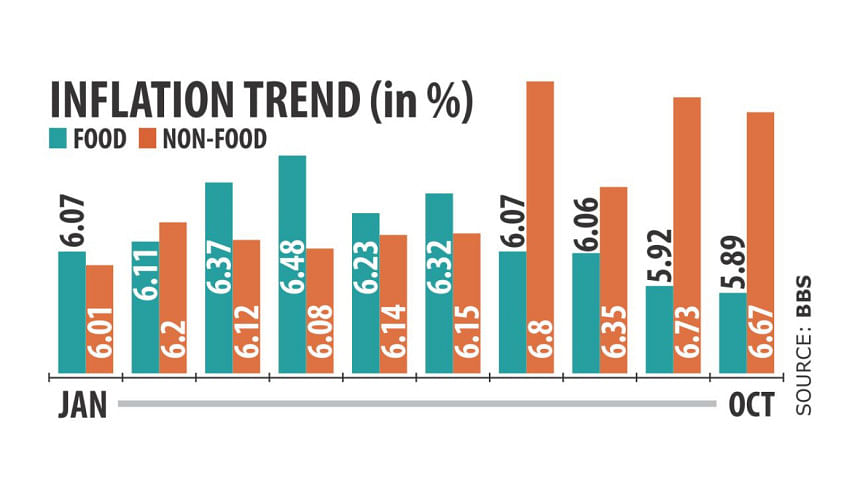Inflation continues its slide in October

Inflation continued to decline in October, dropping 5 basis points to 6.19 percent from the previous month, much to the relief of the central bank.
When the monetary policy for the current fiscal year was announced in July, it was mentioned that there are risks of inflationary pressure.
But for the third month in a row, the overall inflation rate has remained stable, meaning there will be no need for the central bank to make changes to the monetary policy in December.
Inflation appears to have remained stuck in the
6.2-6.4 percent range since November 2014, said Zahid Hussain, lead economist of the World Bank's Dhaka office.
“I hope inflation will fall further when winter vegetables will be available in the market on full scale,” said Planning Minister AHM Mustafa Kamal while releasing the inflation data yesterday. Both food and non-food inflation dropped during the month, according to data from the Bangladesh Bureau of Statistics.
Food inflation fell 3 basis points from September to 5.89 percent and non-food inflation 6 basis points to 6.67 percent.
In the past 12 months, food inflation declined, while non-food inflation went in the opposite direction.
A BB official blamed the gas and electricity price hikes in recent times for the high non-food inflation.
Although the international prices have been stable, and even declining in many cases, the domestic supply and demand side factors contributed to sustaining non-food inflation at a relatively high level, Hussain said.
These include supply disruptions caused by political instability; adjustment of electricity and gas prices; public sector wage increase announcement; and possibly a pickup in consumer demand induced by a rebound in remittances in fiscal 2014-15.
Inflation inertia is also an important factor in Bangladesh: nominal prices tend not to decline as easily as they rise, according to the WB economist.
The administered petroleum price has not been adjusted at all despite a 60 percent decline in crude oil prices in the last year and a half, according to the WB Development Update released last month.
As a result, there was no positive impact on non-food inflation.
Even in the case of market-determined domestic price, the long-run response to international price change is muted.
“There is a perception that when a price increases in the international market, the price in Bangladesh domestic market increases almost immediately, but not nearly so fast when price declines in the global markets,” the report added.

 For all latest news, follow The Daily Star's Google News channel.
For all latest news, follow The Daily Star's Google News channel. 



Comments